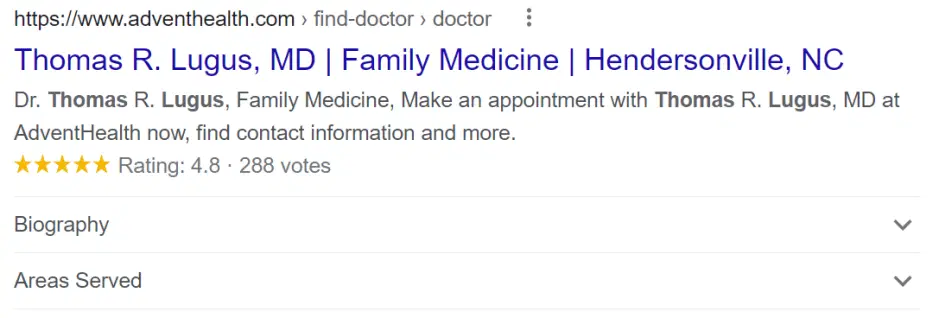Schema markup for medical practices, or structured data, is code that enables search engines such as Google to better interpret and display your website’s content.For medical practices, clinics, hospitals, and even telemedicine providers, schema plays a vital role in improving online visibility and making your listings stand out in search results.
By implementing schema, you can highlight key details such as your doctors, specialties, locations, patient reviews, and services directly within Google’s results. This not only improves click-through rates but also builds trust with potential patients by providing accurate and transparent information at a glance.
In highly competitive U.S. cities such as New York City, Los Angeles, Chicago, Houston, Dallas, San Diego, and Philadelphia, schema can be the difference between being overlooked or chosen by patients searching for reliable care. Whether you’re a single-location clinic or a multi-specialty hospital, structured data ensures your practice is presented professionally and attractively.
To get expert help with schema implementation and boost your visibility, explore our Medical SEO Services.

Why Schema Matters for Doctors and Clinics
For doctors, clinics, and hospitals competing in busy U.S. In competitive cities such as New York City, Houston, and Los Angeles, gaining online visibility can be challenging.This is where schema markup makes a major impact. By adding structured data to your website, you help Google and other search engines understand exactly what your practice offers—whether that’s pediatrics, cardiology, or telemedicine services.
One of the most powerful benefits of schema is improved Medical local SEO visibility. When your address, phone number, and specialties are marked up correctly, your practice is far more likely to appear in local search results, Google Maps listings, and even the coveted local 3-pack. For multi-location practices, schema helps keep each city page organized and consistent, avoiding confusion for both patients and search engines.
Schema also increases your chances of showing up in rich snippets and knowledge panels. These enhanced listings can display reviews, FAQs, operating hours, or even a direct call button, making it easier for patients to connect with you. Compared to competitors without schema, your practice looks more professional and trustworthy—giving patients a reason to choose you over someone else.
Another major advantage is improved click-through rates (CTR). Patients are more likely to click on a listing that shows clear, structured information rather than a plain blue link. Over time, this leads to more patient inquiries, stronger brand authority, and higher overall rankings.
In short, schema isn’t just a technical Medical Practice SEO tactic—it’s a patient-focused strategy that helps clinics build credibility while boosting online performance.
Types of Relevant Schema Markup for Medical Practices
Different types of schema can be applied to medical websites depending on whether you’re a solo practitioner, a multi-specialty clinic, or a large hospital. Using the right schema ensures that search engines correctly display your details, helping patients find and trust your services.
Local Business Schema for Clinics
Local Business schema is essential for clinics, urgent care centers, and specialty practices. It ensures NAP consistency—Name, Address, and Phone number—across your website and directories. It can also include operating hours, maps, and accepted insurance details. For example, a cardiologist in Dallas or a pediatric clinic in Chicago using Local Business schema has a higher chance of appearing in local searches and Google Maps with accurate, verified information.
Medical Organization & Physician Schema
Choosing between MedicalOrganization and Physician schema depends on your practice type.
- Physician schema is best for solo doctors or specialists who want their profiles highlighted in search.
- MedicalOrganization schema works for multi-doctor clinics, hospitals, or medical groups.
This distinction helps Google decide whether to highlight an individual doctor or the entire clinic in search results, which is especially important for competitive cities like New York City or Los Angeles.
Service Schema for Medical Specialties
Service schema highlights your specialties directly within search engine results.For example, telemedicine services in Houston, OB/GYN care in Miami, or endocrinology in San Diego can all be highlighted with structured data. This ensures that patients searching for specific specialties see your services listed clearly, making it easier for them to choose your clinic over competitors.
FAQ Schema for Patient Queries
Adding FAQ schema makes your content more interactive in Google’s search results. It helps clinics rank for voice search queries and appear in the “People Also Ask” sections. For example, a pediatric clinic in Chicago could display answers to common questions like “How do I book a same-day appointment?” or “What insurance plans do you accept?” directly in the search results—improving patient trust and engagement before they even click through.
Case Studies: How Schema Improved Medical Practice SEO for Clinics
Real-world case studies show just how powerful schema markup can be for medical practices across the USA. By combining structured data with smart medical website optimization, clinics are seeing stronger visibility, higher patient trust, and ultimately more appointments booked.
One example is a dialysis center in New York City. By implementing LocalBusiness schema and ensuring ADA compliance across its site, the clinic not only improved its accessibility but also gained a stronger presence in local searches. Patients searching for dialysis treatment in NYC were more likely to see rich results that displayed hours, services, and reviews, resulting in higher conversions.
Another success story comes from a cardiologist in Dallas. By applying Physician schema to highlight the doctor’s credentials, specialties, and patient reviews, the clinic achieved placement in Google’s coveted Local 3-Pack. This prime visibility boosted calls and appointment requests, positioning the cardiologist ahead of larger competitors.
Finally, a telemedicine clinic in Houston leveraged Service schema to highlight its online consultation services. By structuring healthcare content marketing around specialty care and location, the clinic saw an increase in patient leads from both Houston and nearby cities. Patients searching for virtual care were able to find clear, structured listings that built immediate trust.
These cases prove that schema markup isn’t just a technical Medical Practice SEO task—it’s a patient acquisition strategy. Clinics that adopt schema gain an edge in competitive markets.
To see how your practice could benefit, explore our Medical Website SEO Audit service.
Best Practices for Structuring Schema Across Multiple Locations
For medical practices with clinics in multiple cities, schema markup must be structured carefully. Each location and specialty deserves its own schema block to ensure Google understands the differences and patients find accurate information. Proper implementation avoids duplicate data issues and strengthens medical website optimization for long-term scalability.
One Schema per Location
Every clinic location should have a separate schema block. For example, if your practice operates in Dallas, Houston, and Chicago, each location needs its own LocalBusiness schema with unique NAP details (Name, Address, Phone). This ensures local patients searching for care in their city find the right clinic without confusion.
Linking Schema to Structured URLs
Schema works best when tied to well-structured service URLs. For instance:
- /cardiology/houston
- /obgyn/philadelphia
- /pediatrics/chicago
These clean, descriptive URLs combined with schema help Google connect your specialties with specific cities. Patients searching for “OB/GYN in Philadelphia” or “cardiologist Houston” are more likely to find your clinic in local search results.
Balancing Specialty vs. Location Pages
Avoid mixing multiple specialties into one schema block. Instead, create dedicated pages where each specialty and city has its own schema. For example, your Dallas cardiology page should only highlight cardiology, not pediatrics or OB/GYN. This clarity improves both SEO rankings and patient trust, since users land on a page directly matching their search intent.
By following these best practices, healthcare providers can build a structured, scalable SEO framework that grows with each new clinic or specialty. Schema not only improves search visibility but also makes your website easier to navigate for patients across the USA.
Learn more about building a strong foundation with Medical Website Optimization.
How Schema Supports Other SEO Efforts
Schema markup doesn’t work in isolation—it strengthens every other SEO for medical practices. When combined with on-page SEO and healthcare content marketing, it creates a powerful framework that improves both rankings and patient engagement.
For example, well-optimized content about cardiology or pediatrics becomes even more effective when supported by schema. Google can directly connect your clinic’s specialties, locations, and services with patient searches in New York City, Houston, or Los Angeles. This means your content not only ranks but also shows enhanced snippets, making it more clickable.
Schema also builds patient trust, especially when paired with reviews and ratings in search results. A Dallas cardiologist or a San Diego pediatric clinic that displays patient reviews through schema immediately signals credibility. In competitive markets, this can make the difference between a patient booking with your clinic or a competitor.
Additionally, schema reinforces your clinic’s authority in healthcare SEO. Many of the best medical seo services companies use schema as part of their strategy to help clinics appear in local 3-packs, knowledge panels, and “People Also Ask” sections. It’s a tool that not only helps visibility but also supports long-term digital growth.
By integrating schema with structured content, internal linking, and keyword-optimized service pages, clinics can amplify the benefits of their SEO campaigns.
Discover how schema works with Healthcare Content Marketing to drive more patients to your practice.
Conclusion: Schema as a Growth Driver for Medical SEO Services
Schema markup is more than just a technical add-on—it’s a growth driver SEO for Medical Practices . By helping search engines better understand your clinic’s specialties, services, and locations, schema boosts visibility, builds patient trust, and generates more qualified leads. From a cardiologist in Dallas to a telemedicine clinic in Houston, schema ensures your practice stands out in competitive healthcare markets.
One of the greatest strengths of schema is its long-term scalability. Whether you’re opening a new location in Chicago or expanding into specialties like OB/GYN in Miami or endocrinology in San Diego, schema makes it easy to structure your website for consistent visibility. Each new service or location can be added seamlessly without confusing Google or potential patients.
If your clinic wants to attract more patients and grow online, schema should be at the core of your SEO strategy.
Ready to optimize your website for growth? Get a full Medical SEO Services audit today and see how medical website optimization and schema can transform your practice’s visibility.
Frequently Asked Questions about Schema Markup for Medical Practices
Do medical practices really need schema markup?
Yes, schema markup helps make your clinic’s website easier to find. It helps Google understand your services, locations, and doctors. This increases chances of showing up in rich results and maps.
What type of schema should I use for my clinic?
Medical practices should use LocalBusiness schema, Physician schema, and MedicalOrganization schema depending on whether it’s a solo doctor, group clinic, or hospital.
Can schema help my clinic rank better locally?
Absolutely. Schema ensures your address, phone, and specialties are structured in a way Google prefers. This boosts Medical local SEO visibility for searches in Houston, Dallas, and New York City.
Is schema markup difficult to add to my website?
Not necessarily. The majority of schema is implemented with JSON-LD code snippets. A developer or SEO agency can set it up properly and test it in Google’s validation tools.
Does schema improve patient trust?
Yes, schema highlights reviews, services, and key details in search results. Patients tend to trust and choose practices with polished, structured listings.
Can schema be used for telemedicine or specialty clinics?
Yes. Schema can showcase services like telemedicine in Houston or OB/GYN in Philadelphia. Specialty service schema makes it clear what type of care you provide.
How does schema work with reviews and ratings?
With schema, Google search results can show star ratings, reviews, and patient feedback. For clinics in competitive cities like Los Angeles or Chicago, this helps stand out and attract more clicks from potential patients.
Will schema markup help with voice search?
Yes. Since schema makes your content more structured, Google can easily pull answers for voice searches like “best pediatric clinic near me” or “cardiologist SEO expert in Dallas.” This is especially powerful for patient FAQs.
Do I need schema if I already do SEO?
Definitely. Schema doesn’t replace SEO—it enhances it. On-page SEO, healthcare content marketing, and schema work together. Without schema, you may rank, but with schema you can earn richer listings, higher CTRs, and more patient leads.
About the Author
OctalFox, a Digital Studio delivering innovative solutions for healthcare and beyond.
Driving strategies that help your practice or business succeed online.
Connect with OctalFox on LinkedIn

